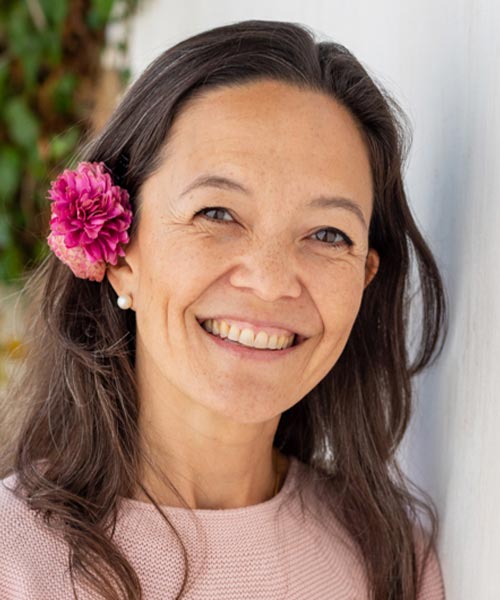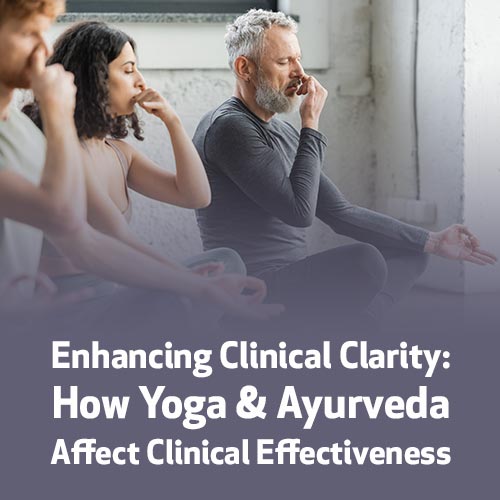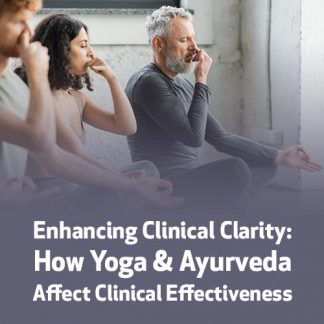Course Overview
The increased use of Yoga and Ayurveda around the globe is seen in the media and in our clinics. Patients and clients who are open to East Asian Medicine may also be open to exploring and therefore combining different cultural medicinal, healing, and spiritual practices that influence their health and wellness.
Yoga and Ayurveda are considered, by some scholars of Vedic traditions, to be “Sister Sciences.” While many people are familiar with the term “Yoga,” many are less familiar with the term or practices of Ayurveda. In addition, many use the term “Yoga” referring to a physical practice of moving the body with the breath. This is a misrepresentation of Yoga and it is creating much disharmony. These misrepresentations trickle into the minds and hearts of patients, clinicians, and the healthcare systems.
Whether you consider yourself an Integrative Medicine practitioner or not, we live in a time when people have more access to cultural practices than ever. It is important as members of the healthcare system to begin unraveling the knots of cultural misrepresentations in our own practices as well as being a role model, guide, leader, and mentor for our patients and clients.
The aim of this course is to give a broad overview of Yoga and Ayurveda and its intersection with East Asian Medicine. In this course, we aim to build a broader understanding of what Yoga and Ayurveda is and how they are similar and different to EAM.
Objectives
-
Practitioners will be able to define Yoga & Ayurveda and know their similarities and differences.
-
Practitioners will understand how the paradigms and practices of Ayurveda and Yoga are similar and different to East Asian Medicine.
-
Practitioners will feel more informed and comfortable talking to their patients and other integrative medicine healthcare professionals about Yoga and Ayurveda and its intersection with East Asian Medicine.
Outline
0 hrs - 15 min
Introduction: Learning Objectives. Syllabus for the Course, Disclosures, Why this topic is important. Self evaluation of understanding of concepts of Yoga and Ayurveda.
15 min - 45 min
Ayurveda: Defining Ayurveda and brief overview. What makes Ayurveda special as a complete medical system. Ayurveda in the U.S. including credentialing. Overview of therapies used in Ayurveda.
45 min - 1.25 hrs
Yoga: Defining Yoga and brief overview. Paths of Yoga. What makes Yoga special. Yoga practices overview.
1.25 hrs - 1.75 hrs
Yoga: Brief history of Yoga in the U.S. Capitalism and misrepresentation of Yoga. Credentialing of Yoga Teachers in the U.S.
1.75 hrs - 2.25 hrs
Ayurveda and Yoga: Similarities of the two sciences. Differences of the two sciences.
2.25 hrs - 2.5 hrs
Comparitive Overview of Ayurveda, Yoga, and East Asian Medicine. Similarities. Differences, Conclusion, References.
Reviews
-
Michele S. (United States of America)
A great course to help identify the similarities and differences of what people are talking about when they speak of using yoga for health
Reviews
A great course to help identify the similarities and differences of what people are talking about when they speak of using yoga for health
Michele S. (United States of America)
Teacher
Haunani Chong Drake
Dr. Haunani Chong Drake (she/her), DACM, is a Licensed Acupuncturist and Chinese Medicine Practitioner in the United States, an international Yoga and Ayurveda educator, trainer, and mentor, and adjunct faculty in the A.A.S Yoga Studies program at Pacific College of Health Sciences (PCHS).
Disclaimers
-
Accessing Your Course
After checking out, your email address will be sent to Net of Knowledge securely and you will gain instant access to your course. If you do not have a Net of Knowledge account yet, one will be created for you automatically and you will receive an email with a link to set up your password. Log in to your account at netofknowledge.com and start learning!
-
Unlimited Access & CEUS
You will have unlimited access to this course for as long as it is on Net of Knowledge, so that you can keep reviewing and learning from it over the years.
CEU requirements must be completed within 1 year from the purchase. During this time, you must view the training and complete any required documents to get your certificate. You must also print and save your certificate for your own records.
-
Cancellation Policy
Please note we do not offer refunds for our recorded online courses/webinars.
-
Note
This recording is available in an online format only; you will not receive a DVD or physical copy of the recording – it is only available to watch as a course to watch on the internet through your online account.




